US Conducts Airstrikes Against Houthi Missile Threat
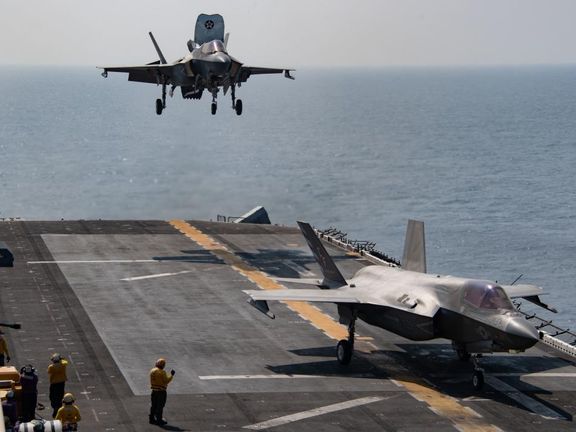
The United States launched another airstrikes on Saturday against a Houthi anti-ship missile aimed at the Gulf of Aden, Central Command announced.

The United States launched another airstrikes on Saturday against a Houthi anti-ship missile aimed at the Gulf of Aden, Central Command announced.
"As part of ongoing efforts to protect freedom of navigation and prevent attacks on maritime vessels, on January 20 at approximately 4 a.m. (Sanaa time), US Central Command forces conducted airstrikes against a Houthi anti-ship missile that was aimed into the Gulf of Aden and was prepared to launch," CENTCOM said in a statement.
The decision to launch the airstrikes was prompted by an assessment that the Houthi missile posed a direct threat to both merchant vessels and US Navy ships operating in the region. The military emphasized that the destruction of the missile was undertaken in self-defense.
The primary objective of this action was to bolster the safety and security of international waters for both US Navy and merchant vessels, according to the CENTCOM.
The recent airstrike is part of a broader series of defensive strikes initiated against Houthi targets since January 12, as outlined by the Biden administration. The goal is to curtail the Houthis' capabilities to target vessels in the Red Sea, a crucial route for global oil and merchandise shipments.
The Iran-backed Houthi forces have been targeting commercial ships in the Red Sea and have issued warnings of potential attacks on all Israeli-bound vessels. The group claims the actions are expressions of solidarity with Palestinians facing what they describe as Israel's "aggression and siege" in Gaza.
Last month, US Defense Secretary Lloyd Austin announced the launch of Operation Prosperity Guardian, a multinational mission aimed at countering Houthi attacks and ensuring maritime security in the region.
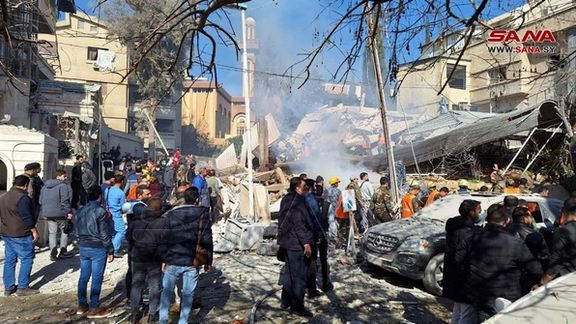
Iran’s Foreign Ministry has strongly condemned a suspected Israeli airstrike Saturday, which claimed the lives of three IRGC generals and two other officers in Syria.
Blaming the strike on Israel and calling it “criminal and aggressive,” the ministry’s spokesman Naser Kanaani urged the international community and the UN Security Council “to adopt a clear stance” and condemn the attack categorically.
The Islamic Republic reserves the right to respond to the offensive “at the appropriate time and place,” he went on to say.
Earlier in the day, Syria’s state-run SANA news agency reported, “An attack targeted a residential building in the Mazzeh neighborhood in Damascus, resulting from an Israeli aggression.”
The IRGC quickly confirmed in a statement that four of its forces lost their lives in the air strikes The slain IRGC officers were named as Hojatollah Omidvar, Ali Aqazadeh, Hossein Mohammadi and Saeed Karimi. A fifth IRGC officer identified as Mohammad-Amin Samadi later succumbed to his wounds and died.
Hojatollah Omidvar, also known as Haj Sadegh and Yousef Omidzadeh, served as the head of the IRGC Quds Force intelligence unit in Syria. According to Iranian state media, Omidvar’s deputy introduced under the pseudonym of “Haj Gholam” was also killed in the attack. It is not yet clear what his real name was.
In June 2023, the Washington Post reported that Omidzadeh “identified U.S. Humvee and Cougar armored vehicles in Syria” in order to target them. According to the report, he discussed assigning operatives to take photos from the roads that US forces in Syria used.
Meanwhile, Iran’s proxies Hamas and Palestinian Islamic Jihad condemned the Damascus attack. Hamas called it “the violation of the sovereignty of an Arab state” and Islamic Jihad accused Israel of attempting to expand the scope of war in the region.
Hours after the deadly incident, Iran-backed militant groups in Iraq launched rockets at Assad Air Base in the western province of Anbar, where US forces are stationed. They sustained no serious injuries in the attack, but several Iraqi troops were wounded.
“This could be Iran’s Axis of Resistance retaliating for the earlier strikes by Israel killing IRGC officers in Syria,” Jason Brodsky, Policy Director at United Against Nuclear Iran (UANI), wrote on X.
Though the Iranian regime has avoided any direct military involvement in the Gaza war, Tehran has used its proxy groups in the region such as Houthis and Hezbollah to attack Israeli and American targets. Yemeni Houthis, in particular, have disrupted regional stability and international trade by targeting shipping lanes in the Red Sea, the Gulf of Aden, and the Bab el-Mandeb Strait.
The Iranian parliament also responded to the killings of IRGC commanders. Parliamentary Speaker Mohamad Bagher Ghalibaf warned that “a severe punishment” awaits Israel as “the warriors will certainly retaliate this crime.”
Esmail Kowsari, a former IRGC general and member of parliament’s National Security and Foreign Policy Commission, confirmed that the whereabouts of the slain commanders in Syria were identified. Kowsari called for the arrest of “spy agents” in Damascus, adding that Israel has had “agents” in Syria, Lebanon and other neighboring countries since the past.
In December, Razi Mousavi (aka Seyyed Razi) was killed in an alleged Israeli airstrike near Damascus. He headed IRGC’s ‘logistics’ and military coordination in Syria, getting weapons for and coordinating Iran-backed forces in Syria and Lebanon.
The Islamic Republic has repeatedly threatened Israel with severe punishments over its alleged role in the killings of IRGC commanders and forces in the region. However, Tehran has refrained from a direct attack against Israel.
Earlier in the week, the IRGC attacked Iraq’s Kurdistan region in what it called an attempt to target Israeli agents. Iran’s missiles hit a civilian house in Erbil belonging to Peshraw Dizayee, killing him and 4 members of his family. Dizayee was a business mogul and head of Falcon Investment Group. Following the raid, IRNA, the Iranian state news agency, released a report that accused Dizayee of collaborating with Israel. Kurdistan officials and the Iraqi government have both rejected the allegation.
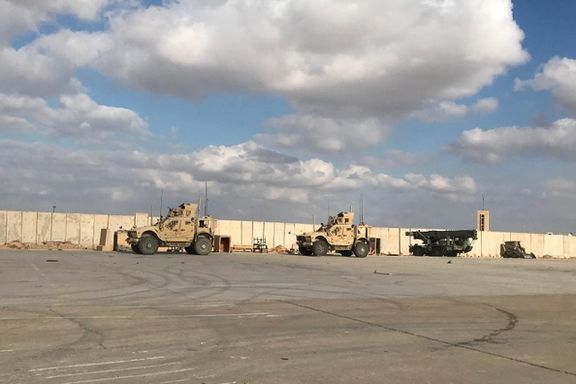
Iran-affiliated militias in Iraq have fired a large number of rockets at the Ain Al-Asad military base hosting US troops on Saturday, Iraqi media reported.
Reuters quoted a US official as saying that American personnel suffered minor injuries and a member of Iraq's security forces was seriously wounded in an attack citing initial assessments, which are subject to change. Some reports later said several Iraqi troops have been wounded.
The attack came after an Israeli air strike killed five officers of Iran’s Revolutionary Guard (IRGC) in Damascus. Among those who died when a building was targeted by precision munitions, was Hojjatollah Omidvar or Hajj Sadegh, a senior Quds Force general, and apparently a senior intelligence officer.
The official, who spoke on condition of anonymity to Reuters, said initial reports indicated that the base was hit by ballistic missiles but left open the possibility the base was hit by rockets, adding an assessment was ongoing.
Iran’s proxy forces in Iraq and Syria have launched around 140 attacks against US forces in both countries since mid-October in retaliation to US support for Israel. The Biden administration has retaliated on a few occasions, but it is not clear how it would respond to this latest attack.
Iran's Foreign Ministry spokesman Naser Kanaani condemned the airstrike in Damascus blamed on Israel saying the Islamic Republic reserves the right to respond to Israel "in an appropriate time and place."

Commanders from Iran's IRGC and Lebanon's Hezbollah are in Yemen helping to direct Houthi attacks on Red Sea shipping, regional and Iranian sources told Reuters.
Iran - which has armed, trained and funded the Houthis - stepped up its weapons supplies to the militia in the wake of the war in Gaza, which erupted after Iranian-backed Hamas attacked Israel on Oct. 7, four regional sources said.
Tehran has provided advanced drones, anti-ship cruise missiles, precision-strike ballistic missiles and medium-range missiles to the Houthis, who started targeting commercial vessels in November in solidarity with Palestinians in Gaza, the sources said.
The Houthi campaign began after Iran’s ruler Ali Khamenei in early November urged Muslims to initiate a blockade of Israel.
IRGC commanders and advisers are also providing know-how, data and intelligence support to determine which of the dozens of vessels travelling through the Red Sea each day are destined for Israel and constitute Houthi targets, all the sources said.
However, Houthis have not necessarily targeted only vessels headed for Israeli ports or linked with Israel.
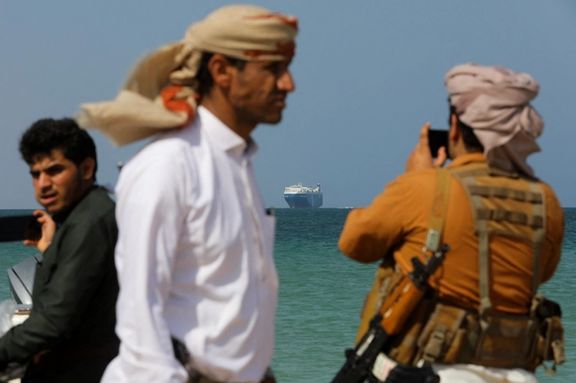
Washington said last month that Iran was deeply involved in planning operations against shipping in the Red Sea and that its intelligence was critical to enable the Houthis to target ships.
In his weekly news conferences, Iran's Foreign Ministry spokesman Nasser Kanaani has repeatedly denied Tehran is involved in the Red Sea attacks.
Houthi spokesperson Mohammed Abdulsalam denied any Iranian or Hezbollah involvement in helping to direct the Red Sea attacks when contacted by Reuters.
Houthi attacks have affected global shipping between Asia and Europe through the Bab al-Mandab strait off Yemen. That has triggered US and British air strikes on Houthi targets in the country, opening a new theater of conflict linked to the war in Gaza.
"The Revolutionary Guards have been helping the Houthis with military training (on advanced weapons)," an Iranian insider told Reuters. "A group of Houthi fighters were in Iran last month and were trained in an IRGC base in central Iran to get familiar with the new technology and the use of missiles."
The person said Iranian commanders had travelled to Yemen as well and set up a command center in the capital Sanaa for the Red Sea attacks which is being run by the senior IRGC commander responsible for Yemen.
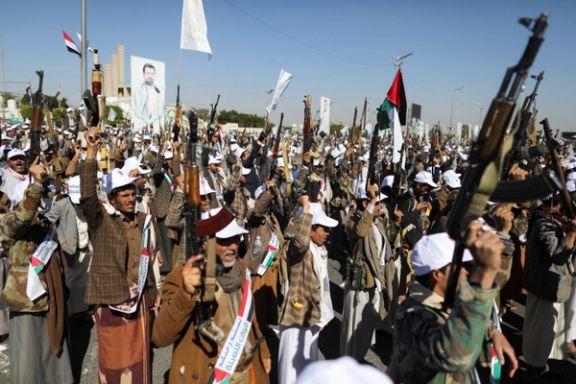
REGIONAL STRATEGY
The Red Sea attacks fit in with Iran's strategy of expanding and mobilizing its regional Shi'ite network of armed militias to project its influence and show its ability to threaten maritime security in the region and beyond, two analysts said.
They said Tehran wanted to show that the Gaza war could be too costly for the West if it drags on.
Tehran has avoided direct military involvement in the Gaza war, mainly using its proxy forces to project power.
"The Houthis are not acting independently," said Abdulaziz al-Sager, director of the Gulf Research Center think-tank, who based his conclusion on a close analysis of the capabilities of the group, which has an estimated 20,000 fighters.
"The Houthis, with their personnel, expertise and capabilities are not that advanced. Dozens of vessels cross through Bab al-Mandab daily, the Houthis don't have the means, resources, knowledge or satellite information to find the specific target and attack," he said.
White House national security spokeswoman Adrienne Watson also said last month that Iranian-provided tactical intelligence had been critical in enabling the Houthis to target ships.
According to two former Yemeni army sources, there is a clear presence of IRGC and Hezbollah members in Yemen. They are responsible for supervising military operations, training and reassembling missiles smuggled into Yemen as separate pieces, the two people said.
Abdulghani Al-Iryani, a senior researcher at the Sana'a Center for Strategic Studies, an independent think-tank, told Reuters: "It is clearly the case that the Iranians are helping identify the target and the destination. There is no local Houthi capacity to do that."
One senior regional source who follows Iran and who spoke on condition of anonymity said: "The political decision is in Tehran, the management is Hezbollah, and the location is the Houthis in Yemen."
WEAPONS AND ADVICE
Houthi spokesperson Abdulsalam said the group's aim was to target Israeli ships heading to Israel without causing any human or significant material losses. US and British strikes on Yemen would not force them to back down, he said.
"We don't deny that we have a relationship with Iran and that we have benefited from the Iranian experience in training and military manufacturing and capabilities, but the decision taken by Yemen is an independent one that has nothing to do with any other party," he said.
But a security official close to Iran said: "The Houthis have drones, missiles and everything needed for their fight against Israel, but they needed guidance and advice on shipping routes and ships, so it has been provided to them by Iran."
When asked what kind of advice Tehran offered, he said it was similar to the advisory role taken by Iran in Syria, ranging from training to overseeing operations when needed.
"A group of Iranian Guards members are in Sanaa now to help the operations," the security official said.
Washington and Persian Gulf Arab states have repeatedly accused Iran of arming, training and financing the Houthis, who follow an offshoot of Shi'ite Islam and are aligned with Tehran as part of its anti-Western, anti-Israel "Axis of Resistance" alongside Lebanon's Hezbollah and groups in Syria and Iraq.
While Iran has denied having any direct role in the Red Sea attacks, Khamenei has praised the Houthis, saying he hoped their strikes would last "until victory".
Adapted version of an exclusive Reuters report
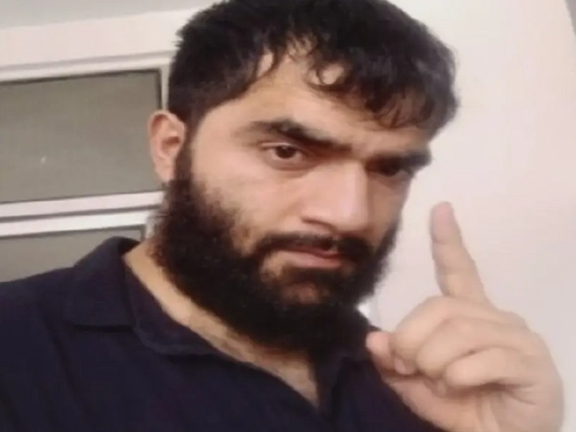
Adel Arif, who is suspected of being involved in recent twin bombings in Iran, had masterminded several attacks in Afghanistan, a former Afghan security official said.
Ahmad Zia Saraj, the last director of national security in the former Afghan government, told Afghan International that Arif was the architect of the attacks on Kabul University and Afghanistan’s presidential palace, among several others.
According to Saraj, Arif was arrested three years ago and was handed down a death penalty but was later released from prison after the Taliban took over of Afghanistan.
Due to his ties with the Taliban’s Haqqani network, Arif drove around Kabul in armored vehicles during the first eight months of Taliban’s rule, noted Saraj, further stressing that he was a close friend of Shahab al-Muhajir, the head of the Islamic State - Khorasan Province (ISIS-K), which is the militant group’s Afghanistan branch.
Saraj stated that “with Taliban entering Kabul, some 4,000 ISIS members were released from prison and dispersed across Afghan provinces and the region.”
Iran’s Intelligence Ministry announced in a statement on Friday that several ISIS-affiliated “terrorists” were arrested in connections with Karman bomb attacks on January 3.
The ministry accused Adel Arif, known as Adel Panjshiri, of having a hand in the attacks, adding that he has entered areas in western Tehran and is wanted.
On January 3, bombs targeted a memorial ceremony at the tomb of IRGC’s Qasem Soleimani, claiming the lives of nearly 100 people. The Afghanistan branch of the Islamic State group claimed responsibility. Iran launched missiles at targets in Syria earlier this week, claiming to have hit an ISIS training camp.
Soleimani, the Iranian regime’s top military and intelligence operator in the Middle East, was killed in a US drone strike in January 2020 in Iraq.

A senior IRGC officer and the governor of Iran’s East Azarbaijan province died on Saturday due to what officials said was a “respiratory and pulmonary illness.”
Zeinolabedin Khorram-Razavi, a former commander of the Revolutionary Guards, gained prominence when he and 47 others were abducted by opponents of the Syrian regime in July 2012 during the early years of the Syrian civil war. He was also known by a shorter version of his name as Abedin Khorram.
The Islamic Republic initially denied the presence of military personnel in Syria, portraying the abductees as ordinary citizens on a pilgrimage and falsely presenting them as retirees. The kidnappers, opposing President Bashar al-Assad, demanded the cessation of Iran's support for the regime and threatened to kill the hostages if their demands were not met.
Khorram-Razavi and the other captives were eventually released in January 2013, as part of an exchange for 2,130 inmates held in Syrian prisons.
Khorran-Razavi was heavily involved in suppression of the nationwide protests in November 2019, as the IRGC and its agents killed 1,500 civilians and arrested thousands.
After being appointed as the governor, he faced criticism, particularly for his handling of the protests. The Etemad Melli newspaper highlighted that his appointment aimed to exert greater control over the security situation in the region. Once President Ebrahim Raisi was elected in June 2021, he appointed many senior IRGC officers as provincial governors.
During his inauguration ceremony held in October 2021, chaos ensued when one of the participants slapped Khorram-Razavi. The incident unfolded in the presence of the Minister of Interior, adding a controversial chapter to his tenure as governor.